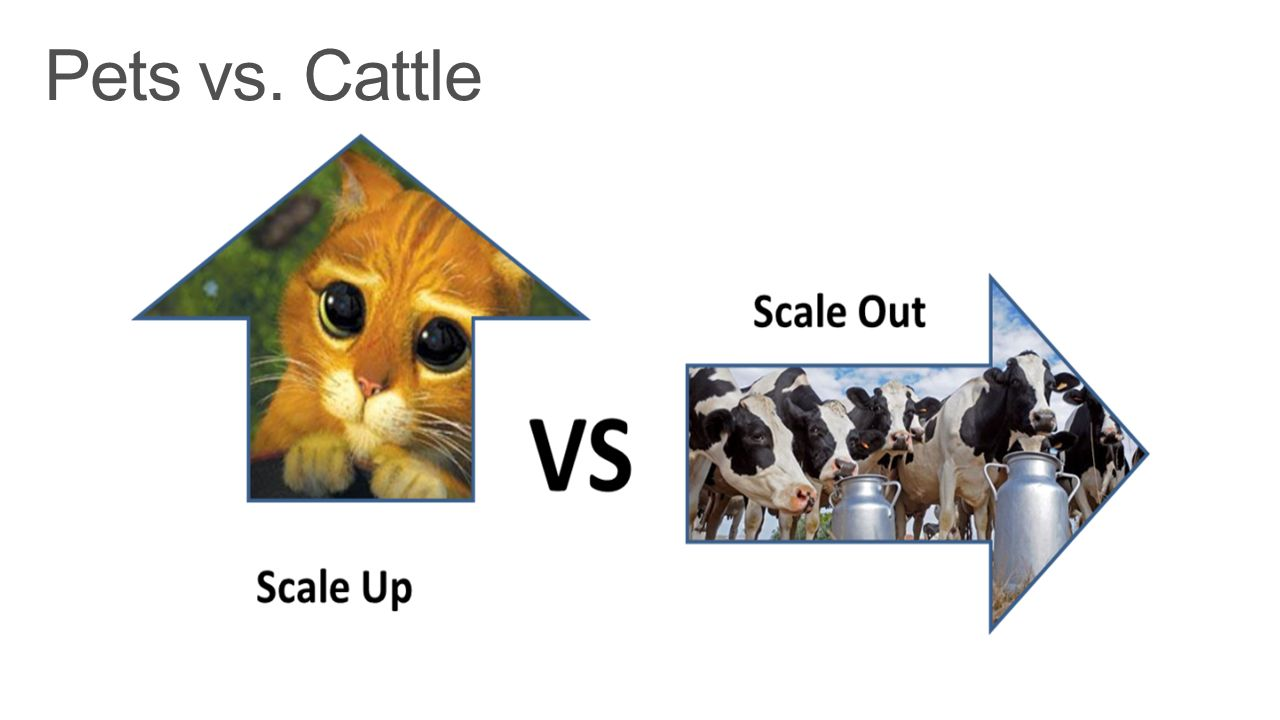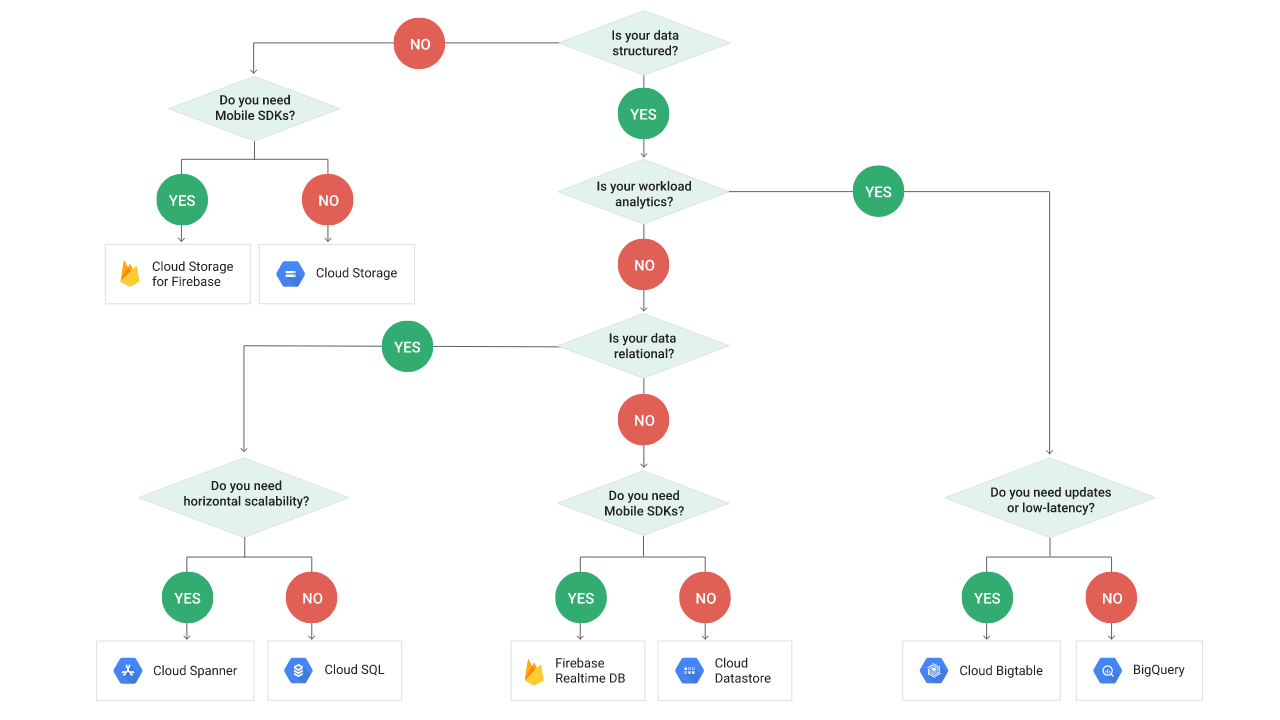Why Public Cloud?
In the last many years I've been strongly focusing on the Cloud. I have to admit though that due to various conversations with my customers, Public and Hybrid models have been getting more and more attention, and I can see how when I hear the problems of their businesses - Public or Hybrid Cloud is the answer! So, why aren't they all moving their services and applications to the cloud yet? 3 reasons actually:- Their applications are not Cloud Native. No, you can't just migrate your VMs from VMware to the Public Cloud and say that you're running a Cloud Architecture, you need to kill your pets and grow your cattle (google "Pets vs Cattle" if this sounds like a complete nonsense, and then check out the diagram below).
- They have prejudice about Security and Speed of the Cloud. This is partly true... but Public Clouds are continuously improving their infrastructure. Google has invested a LOT of money in Security and High Speed Networking (global mesh redundant FO network). Most companies cant match this.
- They're a bit scared of the horror stories of insanely large bills that some of the pioneers got when they moved to cloud. This just means that you need to be well informed what and how you want to use, you need to plan your application migrations, and have a managed service capable of optimising your costs, performance and price wise.
Why Google Cloud Platform (GCP)?
With all this in mind, a few months ago I started my path to get certified in Google Cloud Platform as a Cloud Architect. Yes, I know that AWS and Azure are the current market leaders, but let me tell you why my money is on GCP:- Google's Cloud is the clear winner when it comes to compute and storage costs.
- GCP provides a better approach to discounted long-term usage: Instead of requiring users to reserve instances for long periods of time as AWS does, GCP will automatically provide discounts the longer you use the instance - no reservations required ahead of time.
- With 5 years head-start, AWS offers a lot more cloud products and options. Even though GCP doesn't offer as many services (at the moment), I have a strong feeling that it's a sleeping giant, and I want to be there when it wakes up!
- Google is also pioneering efficiency, 100% carbon neutral since 2007, 50% less energy use then the typical DC.
- Last, but not the least, Azure is tied to the MS customers, AWS has a somewhat closed system of it's own (yes, I know they started using Kubernetes, after a long period of resisting the market), and GCP gives the feeling of a most opened platform, which is extremely important when it comes to the Hybrid IT.
How did I prepare for the exam?
CURRENT STATUS: PASSED!!! Find the details here.Step 1: Get skilled
I passed quite a few difficult exams during my professional career, including Cisco's CCIE and VMware VCIX, so I kinda know what I should be expecting. Google Cloud Architect is a relatively new exam, so there is not enough feedback on the courses that I've found online. I did a few GCP courses, just to get into the "rumbo", and let me tell you what I've found:
Blueprint: First I went to Google's official page, and scheduled, read a blueprint, all the documentation, and got an idea how the exam is. You can read it all here.
Then I simply went ahead and scheduled an exam 3 months ahead of the starting date, to give my self motivation to work harder on it.
GCP Account: I opened an account at GCP, and started playing around. Google gives you 300$ to just "enjoy the experience" for 12 months. Don't be lazy, I was amazed with how smoothly it works. There are projects in BETA, some are pretty mature, check out the Compute, Container and App Engine, see what the Google Launcher can do (use this one!).
Udemy: Google's official documentation is complete, but insufficient. I went to Udemy, and purchased the 26 hours and 60 Demos "GCP: Complete Google Data Engineer and Cloud Architect Guide", that you can find here. This cost me around 20 euros. The Data Engineer part was also important for me, as GCP relies heavily on Data Bases, and I must admit - having spent most of my career in a Data Center with the infrastructure, I'm not really a Data Base expert, so I had a lot to learn. This course was Ok, not too long, and even though it's not the best quality - I'd recommend it as a starting point.
Google Cloud Next '17: Go to the YouTube channel, and just watch all the videos from Google Cloud Next that sound interesting. There's a bunch of great material there.
Linux Academy: These guys have a really high quality courses, and I strongly recommend you to purchase 1 or 2 months of subscription (49$ a month), depending on how much time you can dedicate to studying weekly, and get all 3 courses done. I did it, and I think once I did, I really got the feel of what GCP is all about:
Linux Academy: These guys have a really high quality courses, and I strongly recommend you to purchase 1 or 2 months of subscription (49$ a month), depending on how much time you can dedicate to studying weekly, and get all 3 courses done. I did it, and I think once I did, I really got the feel of what GCP is all about:
- Google Cloud Platform Architect, Part 1
- Google Cloud Platform Architect, Part 2
- Google Cloud Platform Architect, Part 3
Read: There are so many Blogs, Videos and Materials out there about GCP. Google it, read it, have your opinion, read the comments, that way you'll get the feeling of how the platform has been evolving.
Reflect: If you check out the below diagram, taken from one of the better blogs out there, and you're 100% clear about all the flows, you're good to procede with the Step 2.
Step 2: Tell people you're preparing for the Exam
You can Tweet, Blog or just comment it to few of your colleagues. Having in mind that they'll ask you how the exam went will make you take it more seriously, because in the world of preparing for the exams, the excuses are the low hanging fruits.Step 3: Build something
Even though the exam is theoretical, you will be given actual use cases, so you do need a hands-on experience. I went and started building a Wordpress project for my newest personal site - a Mat's Cloud Wiki-like Hybrid Cloud knowledge base. I'll publish it as soon as I get something nice.
Step 4: Practice
Do a MOCK lab, do bunch of practice labs that you can find online (for example, check this out), be sure you understand all the technologies.








Needed to compose you a very little word to thank you yet again regarding the nice suggestions you’ve contributed here.aws training in Chennai
ReplyDeleteI wondered upon your blog and wanted to say that I have really enjoyed reading your blog posts. Any way I’ll be subscribing to your feed and I hope you post again soon.
ReplyDeletePHP Training in Chennai
PHP Course in Chennai
Web Designing Course in chennai
Hadoop Training in Chennai
German Language Classes in Chennai
PHP Training in Porur
PHP Training in Adyar